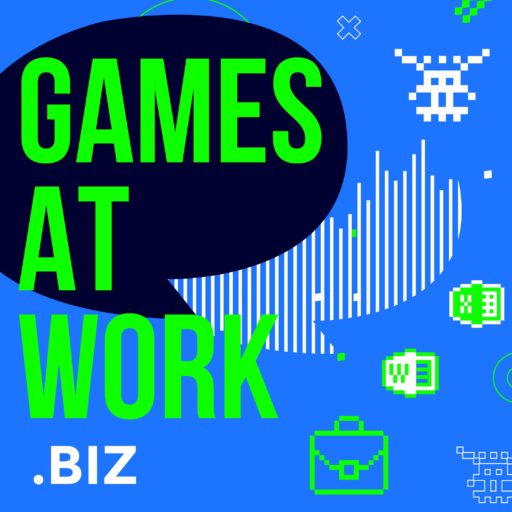
Published 7 October 2024
Co-hosts Andy, Michael and Michael start off the show with a follow on discussion from last week’s episode on the future of work and AR glasses. This theme is not new at all to the Games at Work crew – many examples of the future of augmented reality coming through glasses can be found in the back catalogue – and some from more than a decade ago are included in the show notes. Michael M brings up a recent interview with Mark Zuckerberg by the Acquired.FM team where the Meta CEO contrasts an open technology ecosystem vs a closed system operated by competitors that hinder innovation and speed. Michael M further postulates that at some point, there will be a cultural norm of taking glasses off, just like cellphones face down, to signal that people are really in the moment with one another, without technology helping/interfering with how people communicate.
A privacy problem for an AR use case?
One of the superb use cases for AR the Games at Work co-hosts have discussed many times is the ability to recollect name of the person you are looking at and details of previous interactions. Michael R brings up a timely Apple Intelligence television advertisement dealing with this topic – see the show notes for the video. A couple of articles put the focus on how this may go awry, with facial recognition quickly identifying a person, allowing a nefarious actor to feign and exploit a non-existent relationship. These stories include examples of how one may opt out of facial recognition databases, however, new databases will crop up every day to replace them. In a similar vein, the advances in AI photographic and video editing can provide an opportunity to trick people into alter memories.
Who owns your data?
Next up, the team takes on the thorny topics of OpenAI changing to a for profit business, and 23 and Me about to sell the company. Both of these topics bring with them the notion of how the data accumulated by these entities may be used in the future. And with such future use, what are the appropriate protections that individuals may take in the meantime.
NC in the News
Wrapping up the episode this week is a series of technological and supply chain stories stemming from the ongoing challenges stemming from hurricane Helene’s damaging wind and water across the southeast United States. The team focuses in particular on the impacts to western North Carolina, where the rainfall and subsequent flooding have caused immense damage to people, homes, businesses, hospitals, schools, universities and so much more. The team discusses stories of exacerbating these challenges by malicious actors operating across social media, extolling conspiracy theories and deliberate misinformation, hampering rescue and recovery efforts. Andy brings into the conversation how changes in how stories and news are prioritized contributes to these problems.
It is clear that the world is a small, small place, and the lives of people are interconnected in ways that we can clearly see and so many ways that are not immediately visible, yet just as vital.
Will you be taking action with PimEyes or 23 and Me? What cultural norms do you expect to emerge from AR technological advances? Have your bots 🤖 drop our bots 🤖 a line at @gamesatwork_biz@botsin.space (our home for now) and let us know!
These show notes were lovingly hand crafted by a real human, and not by a bot. All rights reserved. That’s our story and we’re sticking to it.
Selected Links
Glasses are the future of computing?
Six Colors blog post: Meta and Apple: Same game, different rules
Games at Work e81: One Step Beyond
Games at Work e87: Squeezing out some value
Games at Work e180: Augmented Beer Goggles
Games at Work e190: Crazy to the Macs
acquired.fm The Mark Zuckerberg Interview
The Verge article: Microsoft to end its Android apps on Windows 11 subsystem in 2025
Ars Technica article: Meta smart glasses can be used to dox anyone in seconds, study finds
The Verge article: College students used Meta’s smart glasses to dox people in real time
New MIT research has found that AI-edited photos can reliably induce false memories of events personally experienced.
The scientists called them "synthetic human memories."
https://machinesociety.ai/p/new-ai-trick-synthetic-human-memories
Machine | Society blog post: New AI trick: ‘synthetic human memories’
Data – who owns it?
Vox article: OpenAI as we knew it is dead
The Atlantic: Remember That DNA You Gave 23andMe?
23andMe: Downloading & deleting your 23andMe data
North Carolina in the News
Ars Technica article: Helene takes ultrapure quartz mines offline, threatens tech supply chains
@mpesce@arvr.social turned up this Wired article from 2018 about the quartz in Spruce Pine https://www.wired.com/story/book-excerpt-science-of-ultra-pure-silicon/
Wired article: The Ultra-Pure, Super-Secret Sand That Makes Your Phone Possible
North Carolina Department of Environmental Quality: Gold of NC
NPR article: Politically charged rumors and conspiracy theories about Helene flourish on X
Hikari’s blog: the algorithm is killing twitter and it’s driving me insane
@hikari thank you for writing that and I’m sorry you have been through that emotional journey. I had a similar but different one (see https://buttondown.com/andypiper/archive/andys-discoveries-and-musings-issue-8-advocate/ and https://buttondown.com/andypiper/archive/andys-discoveries-and-musings-issue-9-from-there/ and https://andypiper.co.uk/2023/07/31/goodbye-to-my-life-on-twitter-2007-2023/)
I completely agree with your conclusions; but, it is and was Musk and everything he brought about, that killed Twitter.
WUNC article: To combat misinformation, start with connection, not correction
Washington Post article: Helene response hampered by misinformation, conspiracy theories
CBS News article: In Finland, classes in recognizing fake news, disinformation
Wikipedia article: Subliminal stimuli
Podcast: Play in new window | Download (Duration: 41:50 — 58.1MB) | Embed
Subscribe: Apple Podcasts | Spotify | Amazon Music | Android | Podcast Index | Youtube Music | RSS | More

[…] « e526 — Beans and Bricks […]